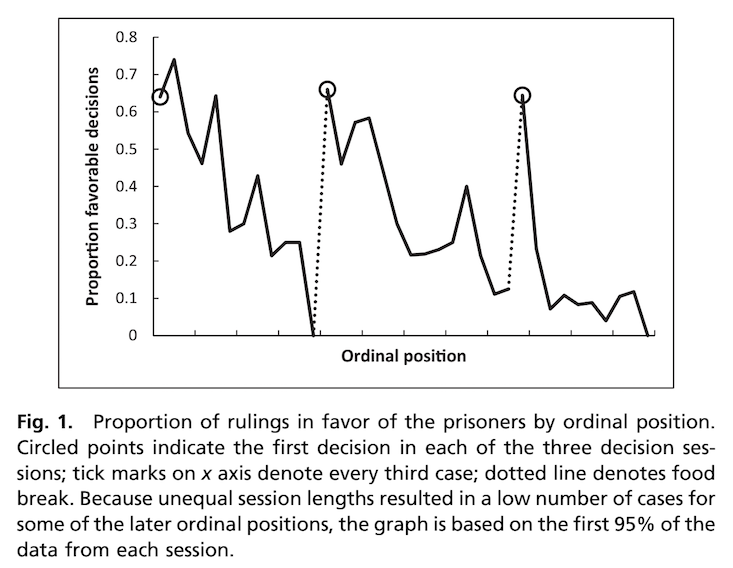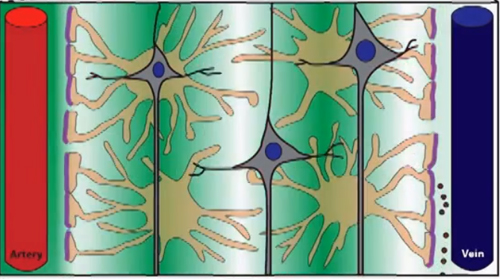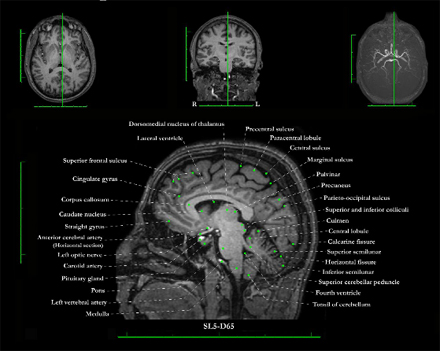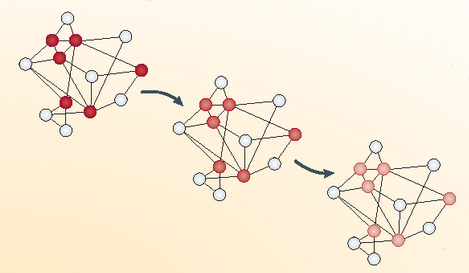Wednesday, 5 February 2020
Blood-glucose levels influence judges’ decisions less than we think
 Science is based on empirical facts, such as data gathered in experiments. But it is also based on the interpretation of these facts, what they mean, what may have made them possible. (In scientific articles, the data—the facts—are presented in the “Results” section and interpreted in the “Discussion” section.) It should be no surprise that in any given field of science, some scientists may disagree with the way that their colleagues have interpreted certain results. Such disagreements arise in all scientific disciplines, especially in psychology, and especially when the data are very clear-cut or the correlations are very strong. And it’s just that kind of a case that I’d like to discuss in this post today (maybe in some future post, I will discuss the broader results-reproducibility crisis that has been shaking psychology for some years now). (more…)
Science is based on empirical facts, such as data gathered in experiments. But it is also based on the interpretation of these facts, what they mean, what may have made them possible. (In scientific articles, the data—the facts—are presented in the “Results” section and interpreted in the “Discussion” section.) It should be no surprise that in any given field of science, some scientists may disagree with the way that their colleagues have interpreted certain results. Such disagreements arise in all scientific disciplines, especially in psychology, and especially when the data are very clear-cut or the correlations are very strong. And it’s just that kind of a case that I’d like to discuss in this post today (maybe in some future post, I will discuss the broader results-reproducibility crisis that has been shaking psychology for some years now). (more…)
From Thought to Language | No comments
Wednesday, 8 January 2020
The Glymphatic System: The Sewers of the Brain

As has been well established, the human brain consumes tremendous amounts of energy: about 20 to 25% of all the energy that the body uses, even though this organ accounts for only 2% of the body’’s total weight. As a result, the brain necessarily produces large amounts of waste—the equivalent of its own weight in waste every year! But this waste can be toxic to the brain itself. How the brain gets rid of this waste was long a mystery to scientists. Some thought that the brain might cleanse itself through passive diffusion of cerebrospinal fluid from the cerebral ventricles, but this seemed like a very slow waste-removal mechanism for such an active organ as the brain. It was not until 2012 that studies on mice showed that the brain has its own specific waste-removal mechanism that is faster and more efficient.. (more…)
From the Simple to the Complex | No comments
Monday, 25 November 2019
Three On-Line Atlases of the Human Brain

This week I want to tell you about three different on-line atlases of the human brain. All three will let you satisfy your curiosity by exploring the inmost recesses of the most complex object in the known universe, of which each of us has an example right between our ears. So stand warned: this post may well leave you spending even more time on your computer than usual! (more…)
From the Simple to the Complex, Uncategorized | No comments
Tuesday, 22 October 2019
Why forgetting can save your life

When we think about human memory, it tends to be with the implicit assumption that more is always better. But more and more neurobiologists are now asserting the opposite: that forgetting makes us more efficient! This raises two important questions: 1) forgetting what? and 2) more efficient in doing what? Science blogger Tom Siegfried attempts to provide the answers in an article published in January 2019, entitled “Why forgetting may make your mind more efficient.” (more…)
Memory and the Brain | No comments
Friday, 4 October 2019
Karl Friston: toward a grand unifying theory of life and cognition?
 This week I’d like to tell you about a fascinating piece of reporting by journalist Shaun Raviv, in the November 13, 2018 issue of Wired magazine. It’s about one of the most important figures in the cognitive sciences today: Karl Friston. I call Raviv’s piece reporting rather than an interview because he spent more than a week in London in the summer of 2018 researching it. Its title, “The Genius Neuroscientist Who Might Hold the Key to True AI”, might seem sensationalistic, since we all know what a buzzword artificial intelligence has become. But in fact, this title understates the case. As Raviv puts it, “Friston believes he has identified nothing less than the organizing principle of all life, and all intelligence as well.”
This week I’d like to tell you about a fascinating piece of reporting by journalist Shaun Raviv, in the November 13, 2018 issue of Wired magazine. It’s about one of the most important figures in the cognitive sciences today: Karl Friston. I call Raviv’s piece reporting rather than an interview because he spent more than a week in London in the summer of 2018 researching it. Its title, “The Genius Neuroscientist Who Might Hold the Key to True AI”, might seem sensationalistic, since we all know what a buzzword artificial intelligence has become. But in fact, this title understates the case. As Raviv puts it, “Friston believes he has identified nothing less than the organizing principle of all life, and all intelligence as well.”
What Friston offers is the kind of (very) grand unifying theory that doesn’t come along in science every day. But who is this guy with such big ideas? (more…)
From the Simple to the Complex | No comments







